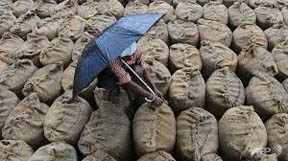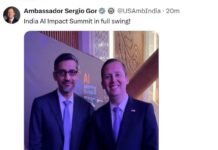 NEW DELHI/WASHINGTON: In a major victory for India, Washington and New Delhi have resolved differences over the food stockpiling issue at the World Trade Organization, paving the way for implementation of the pending trade facilitation agreement to ease customs norms.
NEW DELHI/WASHINGTON: In a major victory for India, Washington and New Delhi have resolved differences over the food stockpiling issue at the World Trade Organization, paving the way for implementation of the pending trade facilitation agreement to ease customs norms.
It has been agreed between the two countries that the ‘peace clause’, crucial for uninterrupted implementation of India’s food security program, will continue indefinitely till a permanent solution is found by the WTO.
As per the Bali agreement, the peace clause, which gives legal security to member countries and protects them from being challenged under other WTO agreements, was to continue till 2017.
“India and the US have successfully resolved their differences relating to the issue of public stockholding for food security purposes in the WTO in a manner that addresses our concerns.
“This will end the impasse at the WTO and also open the way for implementation of the Trade Facilitation Agreement (TFA),” Commerce and Industry Minister Nirmala Sitharaman told reporters here.
Attributing the successful bilateral talks to Prime Minister Narendra Modi’s visit to the US in September, she said “After the Prime Minister’s visit to US, there was a greater understanding of India’s position.”
In Washington, the US Trade Representative Michael Froman said that the Bali package, which was held up in July after India raised concerns over the food security issue, will now move forward.
“We have overcome that delay and now have agreement with India to move forward with full implementation (of the Bali package),” he said.
Following the agreement between the two important players of the WTO, its highest decision making body — General Council — will review the proposal of the two countries in the second week of December.
Sitharaman expressed hope that the Council would clear the way for India to sign a protocol for implementation of the trade accord. .
India has been demanding extension of the peace clause so that it could continue providing subsidized foodgrains to its poor without being challenged in the WTO.
India had asked WTO to amend the norms for calculating agri-subsidies so that the country could continue to procure foodgrains from farmers at minimum support price and sell them to poor at cheaper rates without violating the WTO norms.
The current WTO norms limit the value of food subsidies at 10 per cent of the total value of foodgrain production.
However, the quantum of subsidy is computed after taking into consideration prices that prevailed two decades ago.
There are apprehensions that once India would fully implement its food security program, it may breach the cap.
Under the peace clause, a WTO member gets immunity against penalty for breaching the food subsidy cap. As per the WTO norms, a developing nation can provide food subsidy of up to 10 per cent of the total farm output.–PTI






